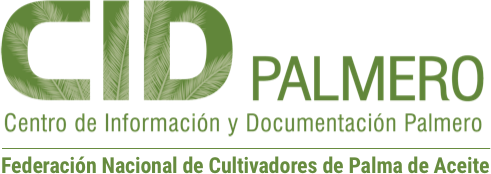| dc.creator | Murgas G., Carlos | |
| dc.date | 1999-01-01 | |
| dc.date.accessioned | 2020-07-25T11:17:37Z | |
| dc.date.available | 2020-07-25T11:17:37Z | |
| dc.identifier | https://publicaciones.fedepalma.org/index.php/palmas/article/view/703 | |
| dc.identifier.uri | http://repositorio.fedepalma.org/handle/123456789/139331 | |
| dc.description | The Minister of Agriculture and Rural Development, Carlos Murgas Guerrero, in his speech at the installation of the XXVII National Oil Palm Growers Convention, held last June 2 in Santa Marta, highlighted the importance of the palm activity for the development of the country's agroindustry. The National Government, conscious of the importance of the cultivation of oil palm for the country -the fourth producer of palm at a world level? is determined to support the work which Cenipalma has been carrying out in the field of research. This is why it is furthering negotiations for the subscription of an agreement which will allow the Center to continue with its investigations on the conservation and expansion of Germoplasm and the production of seeds through the experimental farms of El Mira, La Libertad, La Pepilla and Caribia, where excellent genetic materials exist which will offer great alternatives in the future to the country's palm growers. This agreement seeks to increase the cultivation of palms to 500,000 new hectares within a term of 10 years, which will allow Colombia to strengthen itself in the world market, since countries like Brazil, Ecuador and Venezuela can represent strong competition. That is why the full utilization of products and sub-products must be sought, as well as their development and utilization In the nutritional chain and the oleochemical industry. If this is not done, the country will be condemned to supply only the internal necessities, without possibilities of penetrating the large exportation markets. With a view on the handling of world economy, the National Administration has foreseen the consequences that genetic engineering will produce and, without neglecting the short cycle sowings, it is investing in sectors such as the palm, with the commitment to Increase the palm production at a national level during this four year period by 200,000 hectares. Even though the farming and animal husbandry sector is experiencing a difficult period, the agricultural sector showed a growth of 4.8% during the first quarter of the year, which reflects the confidence of the cultivators on the National Government's policies, giving an increase in the cultivated areas as a result. | en-US |
| dc.description | El Ministro de Agricultura y Desarrollo Rural, Carlos Murgas Guerrero, en su intervención en la instalación del XXVII Congreso Nacional de Cultivadores de Palma de Aceite, realizado el pasado 2 de junio, en Santa Marta, resaltó la importancia de la actividad palmera para el desarrollo agroindustrial del país. El Gobierno Nacional, consciente de la importancia que tiene el cultivo de palma de aceite para el país, -cuarto productor de palma a nivel mundial- está empeñado en apoyar la labor que viene realizando Cenipalma en el campo de la investigación. Por ello adelanta negociaciones para la firma de un convenio que le permita al Centro continuar con sus investigaciones en conservación y ampliación de bancos de germoplasma y la producción de semillas a través de las granjas experimentales de El Mira, La Libertad, La Pepilla y Caribia, donde existen excelentes materiales genéticos que en el futuro ofrecerán grandes alternativas a los palmicultores del país. Este convenio busca incrementar el cultivo de palma a 500.000 nuevas hectáreas en un plazo de 10 años, lo que le permitirá a Colombia fortalecerse en el mercado mundial, pues países como Brasil, Ecuador y Venezuela pueden representar una competencia fuerte. Por ello hay que buscar la plena utilización de productos y subproductos, así como su desarrollo y aprovechamiento en la cadena alimentaria y la industria oleoquímica. De no ser así el país estará condenado a suplir únicamente las necesidades internas sin posibilidades de penetrar en los grandes mercados de exportación. Atendiendo el manejo mundial de la economía, la Administración Nacional se ha adelantado a las consecuencias que traerá la ingeniería genética y, sin descuidar los cultivos de ciclo corto, está invirtiendo en sectores como el palmero, con un compromiso de incrementar, durante este cuatrienio, en 200.000 hectáreas la producción de palma a nivel nacional. Aunque el sector agropecuario vive un mal momento, el sector agrícola presentó un crecimiento del 4.8% durante el primer trimestre del año, lo cual refleja la confianza de los cultivadores en las políticas del Gobierno Nacional dando resultado un aumento en las áreas cultivadas | es-ES |
| dc.format | application/pdf | |
| dc.language | spa | |
| dc.publisher | Fedepalma | es-ES |
| dc.relation | https://publicaciones.fedepalma.org/index.php/palmas/article/view/703/703 | |
| dc.rights | Derechos de autor 2017 Revista Palmas | es-ES |
| dc.rights | https://creativecommons.org/licenses/by-nc-nd/4.0 | es-ES |
| dc.source | Revista Palmas; Vol. 20 Núm. 2 (1999); 88-92 | es-ES |
| dc.source | 0121-2923 | |
| dc.subject | palma de aceite | es-ES |
| dc.subject | elaeis guineensis | es-ES |
| dc.subject | industria de la palma | es-ES |
| dc.subject | desarrollo económico | es-ES |
| dc.subject | mercados | es-ES |
| dc.subject | empresas conjuntas | es-ES |
| dc.subject | alianzas | es-ES |
| dc.subject | Colombia | es-ES |
| dc.title | Oil palm's agroindustry and its challenges for the future of Colombia | en-US |
| dc.title | La agroindustria de la palma de aceite y sus retos para el futuro en Colombia | es-ES |
| dc.type | info:eu-repo/semantics/article | |
| dc.type | info:eu-repo/semantics/publishedVersion | |


